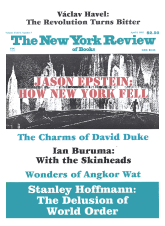In response to:
The Golden 'Blade' from the February 13, 1992 issue
To the Editors:
Garry Wills’ statement that “Buchanan’s admiration for Pius XII helps explain his attitude toward Israel and the Holocaust” is exceedingly strange. Does Wills really mean to imply that every Catholic or, for that matter, non-Catholic, who ever admired Pope Pius XII must automatically have a negative attitude toward Israel and the Jewish People? That is a very wide net to cast.
Wills abuses the source he cites to back up his claim that “Pius opposed the settling of Jews in Palestine.” In the referenced pages, Peter Hebblethwaite does not, as the unwary NYR reader might suspect, even refer to Pope Pius XII. Rather, Hebblethwaite quotes concerns expressed in 1943 by Cardinals Maglione (Vatican Secretary of State) and Roncalli (nuncio in Istanbul and future Pope John XXIII), the former practical with regard to the disposition of the Holy Places and the latter theological. Even though the latter held what he called a “personal scruple” with regard to the implications of what could turn out to be an “indirect contribution” by the Holy See “to the realization of the messianic dream,” both prelates in fact gave their active assistance to “this convoy of Jews to Palestine.”
In other words, despite expressed doubts about the overall aims of the Zionist enterprise, Vatican policy under Pope Pius XII was, as stated by Msgr. Tardini for the Vatican Secretariat of State in August 1944, that “under the present circumstances the Holy See does not advance any objections to the continual dispatching of Jews to Palestine at the present time, as that is justified by the dangers to which Jews are exposed in various countries” (cited in Andrej Kreutz, Vatican Policy on the Palestinian-Israeli Conflict, 1990, p. 78). Similarly, Kreutz concludes, “the Vatican’s lack of official objection (in 1947–48) to the creation of a Jewish State in Palestine greatly influenced various Catholic countries in their political support for the partition plan” (Ibid., 93).
The historical reality of the period under question, it turns out, is far more complex than the simplistic caricature of Pope Pius XII offered to us by Garry Wills and Carlo Falconi.
Eugene J. Fisher
Secretariat for Ecumenical and Interreligious Affairs
International Conference of Catholic Bishops
Washington, DC
Garry Wills replies:
I am glad to exonerate anyone who would escape responsibility for The Dartmouth Review; but since I am not in the habit of inventing “quite clever” things for Jeffrey Hart to say, I can only assume that he mistook four toy fish for Anglo-Saxon names.
Hebblethwaite does not refer to Pius? On the second page I listed (p. 188) he says: “Maglione’s words [about the “transfer of Jews” as endangering the “liberty” of the Holy Places] were worse than any of Pius XII’s ‘silences.’ Yet they represented the firm and considered position of the Vatican [italics added].” Anyone who doubts that Pius’s secretary of state spoke his views misunderstands that autocratic ruler. And a sneer at Falconi does not shake the fact that Pius thought the Holocaust less important than the threat of communism—a position Mr. Buchanan, a self-confessed cultist of Pius, clearly found congenial.
This Issue
April 9, 1992



